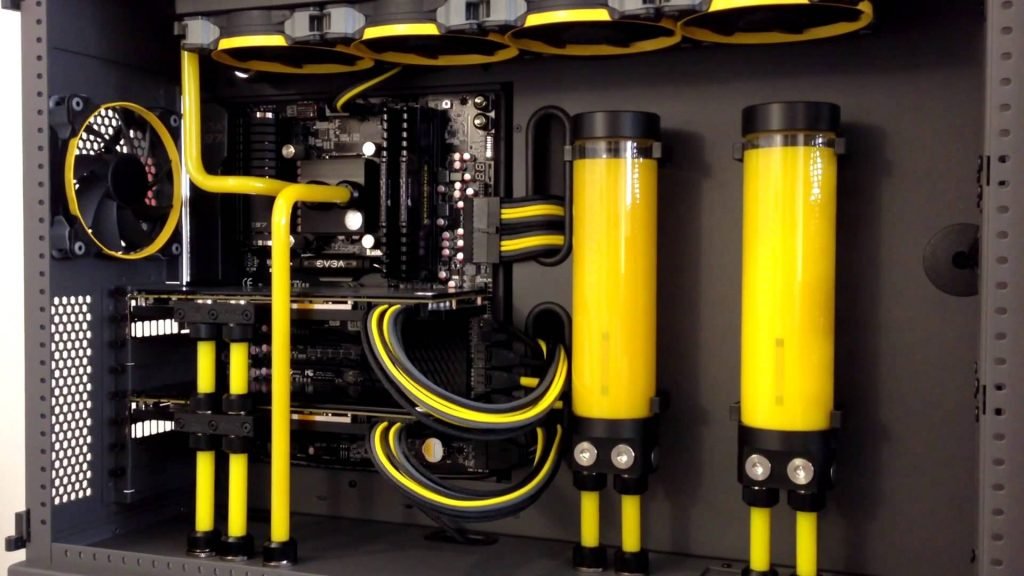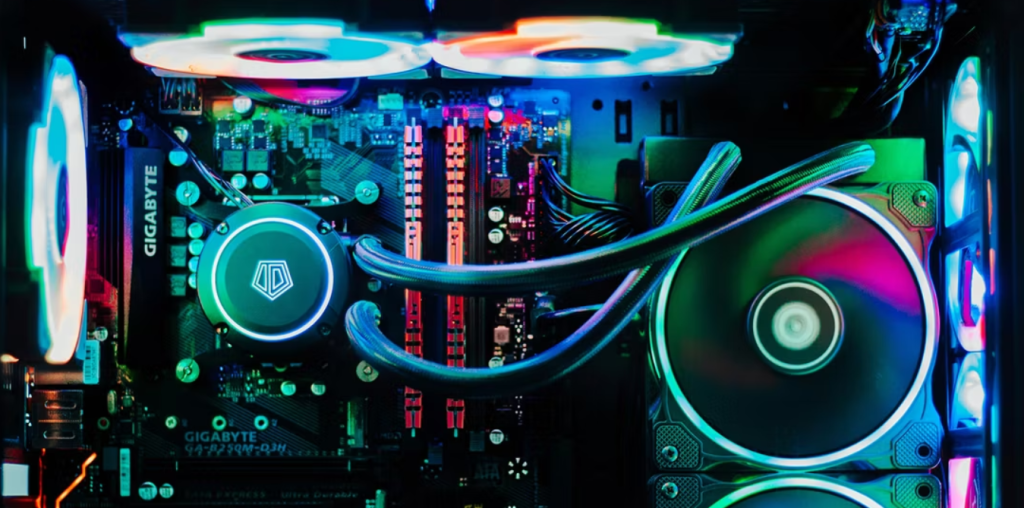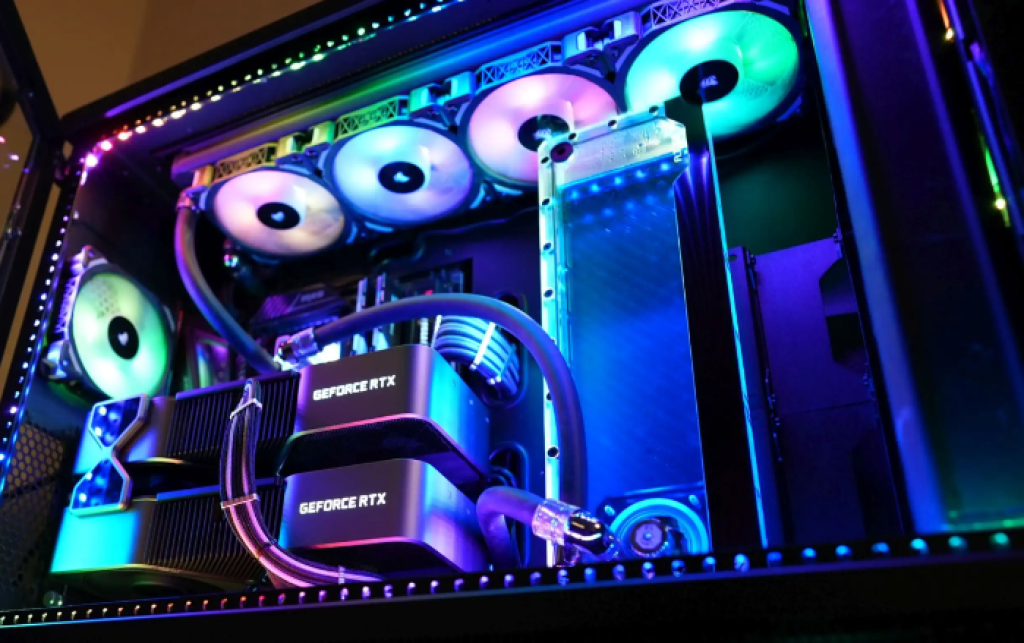PC Cooling Guide – Water Cooling vs AIOs vs Air Cooling
When it comes to keeping your PC cool, there are three main options to choose from: water cooling, AIOs, and air cooling. But which one is the best for your setup? Are there any significant differences between them? And which one should you go for if you’re building a high-performance gaming rig?
In short, water cooling is the most efficient and quietest option for cooling your PC, while AIOs provide a good balance between performance and ease of installation. On the other hand, air cooling is the most cost-effective solution, but it can be noisy and less effective at cooling high-end components.
To help you make an informed decision, we have put together a comprehensive guide to water cooling vs AIOs vs air cooling. We’ll dive into the details of each option, compare their pros and cons, and help you determine which one is right for your specific needs.
And to make sure you’re getting the most accurate information possible, we’ve consulted with some of the top experts in the field of PC cooling. So, whether you’re a hardcore gamer, a PC enthusiast, or just looking for a way to keep your computer cool and quiet, we’ve got you covered.
So, are you ready to find out which cooling solution is right for you? Let’s get started with this PC Cooling Guide!
Custom Water Cooling

Advantages
Cooling Performance
When it comes to cooling performance, custom water cooling loops outperform AIOs and air coolers. They can handle higher temperatures and are necessary for overclocking high-end CPUs. So, if you plan on pushing your hardware to the limit, then a custom cooling loop is the way to go.
Customization
One of the most significant advantages of custom water cooling loops is the level of customization they offer. You have complete control over the tubing, pump, reservoir, water block, radiator, and even the type of liquid you use inside the loop.
Additionally, you can add liquid cooling to other components in your PC, like your graphics card, for even better cooling performance.
Also Read: Best radiators for water cooling
Noise
Custom water cooling loops are the quietest cooling option available. While the pumps and fans might not be completely silent, they produce the least amount of noise compared to other cooling solutions.
Modularity
In case a part of your water cooling loop fails, you can replace it without having to replace the entire system. This is a significant advantage over AIO coolers, where you would have to replace the entire unit in case of failure.
Additionally, you can upgrade components of your cooling loop later on and even top up the fluid in the system as needed, making them more upgradeable and long-lasting than other cooling solutions.
It’s worth noting that custom water cooling loops do require more effort and expertise to set up and maintain than AIOs or air coolers. However, if you’re willing to put in the work, the performance gains and customization options make them a worthwhile investment for serious PC enthusiasts and gamers.
Disadvantages
Price
While custom water cooling loops offer excellent performance and customization, they are also the most expensive cooling option. Each component in a custom loop, such as the pump/reservoir combo, can cost more than some AIO and air coolers. Therefore, if you’re on a tight budget, a custom water cooling loop may not be the most cost-effective choice.
Difficulty
Building a custom water cooling loop can be challenging, especially for first-time PC builders. Unlike installing an AIO or air cooler, it requires more knowledge, expertise, and patience. Furthermore, maintaining a custom loop is also more complex, as you need to keep the fluid levels adequate and ensure that all the components are clean and functional.
Safety
Custom water cooling loops introduce more points of failure and can be risky for inexperienced builders. If something goes wrong, it can cause severe damage to your system. Therefore, it’s crucial to seek supervision from someone experienced or opt for a safer cooling solution if you’re not comfortable with liquid cooling.
Despite these disadvantages, custom water cooling loops remain the go-to solution for PC enthusiasts and gamers who prioritize performance and customization over cost and ease of use. However, it’s important to weigh the pros and cons carefully before investing in a custom loop.
All-in-One (AIO) Water Cooling

Advantages
Cooling Performance
AIO water coolers are an effective cooling solution for computers that run hot. While they may not be as efficient as custom water cooling loops, they can handle sustained heat loads better than air coolers. Additionally, liquid cooling is more thermally conductive than air, which makes AIO coolers an excellent option for high-performance PCs.
Price
One of the most attractive aspects of AIO coolers is their price. They provide a good balance between cost and performance, with some being cheaper than high-end air coolers. For instance, the CoolerMaster MasterLiquid AIO is less expensive than some high-end air coolers while still offering the benefits of liquid cooling.
Ease of Use
AIO coolers are easy to install and manage, especially compared to custom liquid cooling loops. There’s no need to deal with liquid coolant, tightening tubes, or bleeding lines. Simply mount the radiator and block inside your PC, and you’re good to go. This makes them a more straightforward and convenient option for those who want liquid cooling without the hassle of a custom loop.
Safety
AIO coolers are generally safe to use, as they have fewer points of failure and come pre-assembled. This makes the risk of leakage much lower compared to custom loops. While they are riskier than air coolers, AIO coolers still have a low chance of leaking, and they usually come with a warranty that covers damages in case of a manufacturing defect.
In summary, AIO coolers offer a cost-effective, easy-to-use, and safe liquid cooling solution that can deliver better cooling performance than air coolers. They are a great choice for those who want the benefits of liquid cooling without the complexity and expense of a custom loop.
Disadvantages
Less Customization
Although AIO coolers are more customizable than air coolers, they still offer less flexibility than a custom water cooling loop. This means that, like air coolers, you need to ensure that the AIO you choose fits inside your PC. This can limit your options if you have a non-standard case or specific cooling needs.
Not Modular
The convenience of an AIO cooler can also be a disadvantage. Since they come as a single package, if one component of an AIO fails, the entire unit may become useless. For example, if the pump on your cooler stops working, you may need to replace the whole cooler, leaving your PC inoperable until you do so.
Longevity
While AIO coolers have improved over the years, they are still the least long-lasting of the three cooling options. Custom water cooling loops and air coolers can typically last for a decade or more without issues.
However, most AIO coolers have a lifespan of only 5-6 years due to pump failure or permeation. This means that you may need to replace your AIO cooler more frequently than other cooling options, which can add to the long-term cost of ownership.
In summary, while AIO coolers offer more customization options than air coolers, they are still limited compared to custom water cooling loops. Additionally, the convenience of an AIO cooler comes at the expense of modularity and longevity.
However, AIO coolers remain a popular choice for their cost-effectiveness, ease of use, and reliable cooling performance.
Air Cooling

Advantages
Price
While water cooling is generally more efficient than air cooling, it can also be more expensive. Custom cooling loops and AIOs tend to have a higher price tag than air coolers. Even though some high-end air coolers can be more expensive than budget AIOs, they can also outperform them in terms of cooling and noise.
Simplicity
Air cooling is one of the simplest and most straightforward cooling solutions for PCs. With just a heat sink and fan, it’s easy to install and maintain. Simply plug in the fan, mount the heat sink on the CPU with a few screws, and you’re good to go.
Safety
Air coolers offer peace of mind since they don’t involve any liquid cooling components that could potentially leak and cause damage to your hardware. The only point of failure in an air cooler is the fan, which is cheap and easy to replace. A malfunctioning fan may cause thermal throttling, but it won’t cause any serious damage to your PC.
Maintenance
Air coolers require very little maintenance since there are no liquid levels to monitor. The only time you may need to work on your cooler is if the fan fails or if you need to clean it during your annual PC cleaning.
Longevity
Air coolers have a longer lifespan than AIOs, with many air coolers lasting a decade or more. The fan is easily replaceable, and the simple design means that there are fewer points of failure. This means that you can enjoy reliable cooling performance for the lifetime of your PC with little to no maintenance required.
In summary, while air cooling may not offer the same level of cooling efficiency as water cooling, it’s a cost-effective, simple, and reliable cooling solution that requires very little maintenance. It’s a great option for those who want reliable cooling performance without the complexity or expense of water cooling.
Disadvantages
Cooling Performance
Air coolers generally don’t offer the same level of cooling performance as liquid cooling solutions, such as custom cooling loops and AIOs. While some high-end air coolers can perform comparably to budget AIOs, they struggle with high-intensity, short-burst loads and can’t cool extreme loads as effectively as liquid cooling can. However, for a moderate machine used for gaming and basic computing tasks, an air cooler can typically handle the heat output.
Flexibility
Air coolers are not as flexible as custom loops and AIOs. Choosing an air cooler that fits inside your case can be challenging, and you need to ensure that it doesn’t cover any PCIe or RAM slots. Also, unlike liquid cooling solutions, air coolers can’t directly pipe heat out of your case, which means that some of the hot air may blow over other components inside your case on the way out.
Noise
Air coolers can be noisier than liquid cooling solutions, especially cheaper air coolers. While completely passive CPU coolers are available, they tend to be more expensive than active air coolers.
In summary, air coolers have some drawbacks when it comes to cooling performance, flexibility, and noise. However, they are still a reliable and cost-effective cooling solution for moderate machines used for gaming and basic computing tasks. If you need more cooling power, flexibility, and customization options, liquid cooling solutions may be a better fit for you.
